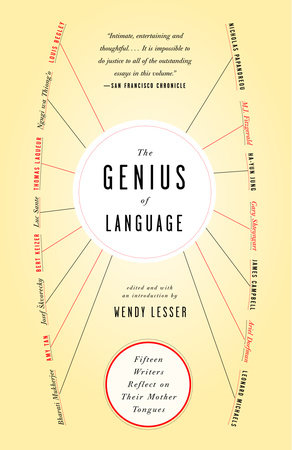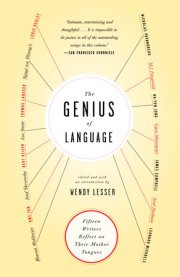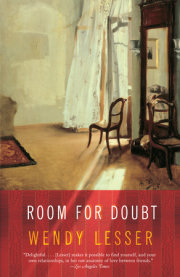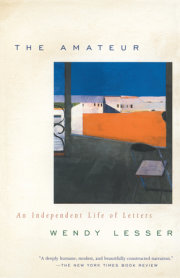The Way Back
By Bharati MukherjeeThere is a reason why the language we inherit at birth is called our mother tongue. It is our mother, forgiving, embracing, naming the world and all its emotions. Though I have lived for the last forty years in cities where English or French is the language of the majority, it’s Bangla that exercises motherly restraint over my provisional, immigrant identity. Mother-Bangla is fixed; I haven’t learned a new word nor had new thought or feeling in Bangla for nearly half a century. I don’t need to. According to group-norms, as a native-born speaker, I have automatic membership in the world’s most articulate, most imaginative and most intelligent club. With its brazen appeals to love and vanity, enforced with coercive guilt, the language sabotages irony towards the community’s billowing self-esteem. Like a child whose mother might tipple or stray, I look for excuses, cannot condemn. To my inner Bengali I remain constant, as it does for me.
How exclusive can a club of nearly a quarter-billion members be? Bangla is the language of Bangladesh, the eighth most populous nation in the world, and of the Indian state of West Bengal, the second-largest linguistic group in India. Millions more, documented or not, have settled abroad. Impressive numbers aside, every Bengali, to her at least, is a majority of one. We harbor the faith, implanted by myth and history, of our exalted place in the hierarchy of breeding and culture.
To international relief agency workers, Bangla is the mother tongue of esurient poverty, but to the heirs of shonar bangla, golden Bengal of harvest-ready paddyfields and fish-filled rivers, it is the mother tongue of poetry, passion and abundance. It is also the language of nostalgia and of tentative hope: nostalgia for the Hindu-Muslim harmony that existed in undivided Bengal before its vindictive partition by the fleeing British; and hope for the shared mother tongue, devotion to the possible tomorrow that will transcend the religious furies exploited by today’s politicians. I think a shared language is stronger than divisive religions. (Based on my travels in Bangladesh, I think Hindu and Muslim Bengalis could cross the abyss between them. It’s the national politics of India and corrupt fiefdoms in Bangladesh that get in the way.)
Up to age eight, I lived exclusively in Bangla. My father was the sole support of forty to fifty relatives, who lived with us crowded together in the ground-floor apartment of a two-storied house in a homogenously Hindu, Bangla-speaking, middle-class neighborhood of Kolkata (until recently mispronounced and misspelled as Calcutta by colonialists). All the adults in our large household had been born in villages or towns in the Dhaka (then “Dacca”) district of East Bengal (now Bangladesh); all their children, my sisters and cousins, in the thriving capital, Kolkata, in West Bengal. Among themselves, the adults spoke the dialect of Dhaka, the children the Bangla of Kolkata. I had no idea as a child that linguists considered the Dhaka dialect “deviant,” and Kolkata the standard. In our home the Dhaka dialect, bangal, was the language of authenticity. You are what dialect your forefathers spoke even if you yourself have lost fluency in it be- cause of successive migrations. We were east Bengalis or bangal first, then Bengali. We distanced ourselves from west Bengalis or ghoti who surrounded us and considered us interlopers. We conducted ourselves as bangal, exiled permanently from our ancestral homeland.
To be born a displaced bangal was to inherit loss of, and longing for, one’s true home. Identity had to do with mother tongue, but home was the piece of land that our forefathers had owned, the soil that they had slept and walked on. To be cast out of your janma bhumi or ancestral birth-soil is to be forever doomed. Unlike dialects, which can be transported by migrants, the loss of janma bhumi is permanent. The diasporic Bengali may own real estate in the country of her adoption, but that real estate can only be her residence, as provisional as her immigrant identity, her home. I think now that this intimate braiding of inherited language, place and identity is why Bengalis never took to the British system of primogeniture. Generation by generation, the extent of ancestral land owned by an individual male was whittled down to specks and strips. It didn’t matter that the shrunken land was unprofitable for cultivation and support of large families. Second, third, fourth . . . eighth, ninth. Sons didn’t emigrate; they just stayed and got poorer. Evaluation was symbolic, not economic.
Even as a child I picked up on our linguistic nuancing of house (basha, bari ), room (ghar), land (jomi), soil (bhumi) and homeland (desh). My cousins and I were alert to the moral of the countless children’s stories about villagers willing to starve rather than sell off inherited strips of bhumi. The most menacing refrain from a popular poem we learned by rote was a rich, greedy landowner’s threatening a desperately poor farmer, “Do you get it, Upen / I’m going to buy up your land.” Even now in comfortable San Francisco, with every mortgage and property tax payment, I can be thrown into panic by that simple refrain. (Refinance? Never! Lock it in and forget about it, like immigrants or Depression-era survivors who distrust banks.) The in- herited culture insists that accidents of impulse and geography have made homelessness my permanent condition; the adopted culture tries to persuade me that home is where I choose to invest love and loyalty.
Better colleges, better job opportunities, natural disasters like floods and famines, and periodic flarings of Hindu-Muslim antago- nism had induced my parents’ immediate families to migrate to Kolkata in the 1920s and 1930s, though they still owned land in their hometowns. My father had been sent to Kolkata to stay with a childless aunt and uncle-in-law so that he could get a sound English-language undergraduate education at St. Xavier’s College, run by Jesuits from Belgium. By then a scholarship student, he stayed for graduate degrees in applied chemistry. After that, as the most educated though not the eldest of nine sons, he dutifully looked for a job in Kolkata, the most prosperous of Bengal’s cities. Dependents and family friends also in need of free food and lodging started arriving from the east as soon as they’d heard that he was job-hunting. For a while, the houseguests commuted from Kolkata to their homes in provincial towns of eastern Bengal, where they still jointly owned an ancestral strip.
The Hindu-Muslim riots of 1946, the fiercest in communal memory, drove the last of the Mukherjee clan out of their hometown, where Muslims constituted an overwhelming majority. The refugees brought with them tales of arson, rape and looting. From their tears and nightmare-hour screams, I learned the special resonance that bhoi, the Bangla word for fear, carries. There is no English equivalence for the scale of terror that bhoi implies. In words such as bhoi, the individual experience of fear is shot through with the memory of unspeakable communal suffering. The partitioning of Bengal in 1947 transformed my vast, extended family from commuters shuttling between residence of convenience and homeland to political refugees stranded in a city where they could never belong. Kolkata was their begrudged place of asylum.
That exilic melancholy was passed on to me in infancy. We refugees were different from, and superior to, ghoti Bengalis. Which end of the soft-boiled egg do you crack, and should we go to war over it? We rejected matchmaking between ghoti families and ours. We made fun of the ghoti inability to pronounce the “l” sound in lebu (lemon) and loochi (deep-fried bread). Whenever the East Bengal soccer team played Mohun Bagan, the West Bengal team, we conducted ourselves not as well-brought-up young women but as rowdy soccer fans. The ghoti, in turn, stereotyped us as provincial bumpkins. We directed our Us- versus-Them pugnacity to people who spoke dialects other than the Dhaka one within the bangal community. Long before I had heard of Freud, I had enacted “the narcissism of small differences.”
In our house, bangal was the language of passion and of discipline. Unhappy wives threatened death by fasting in bangal; virtuous virgins gossipped about neighborhood sluts in it; headstrong young uncles swore at each other in it. Whenever my father had to assume the unwelcome role of patriarch and punish unseemly behavior by a relative, he first, in bangal, consulted his widowed mother, an autocratic upholder of conservative traditions. I remember bangal, however, mainly for the ancient doggerels that my paternal grandmother’s coterie of tobacco-chewing, osteoporosis-bent widows recited for their deft delivery of sexist cruelty. Day in and day out, these widows tormented my mother for having borne three daughters and no sons. I may be walking on Haight Street, but I still hear them repeat their malicious couplets: Puter mutey kori / Meyer galai dori (There’s money to be made off a son’s piss / There’s rope to hang a daughter with).
My mother tongue transmitted unambiguously the society’s values and taboos. Literacy turned women rebellious, unsubmissive, and unmarriageable. My mother, who had been married off the moment she had finished high school, was abused regularly by her in-laws, first for daring to express the hope that she might enroll in a women’s college, and later for wanting to send her three daughters to the best elementary school for girls, which happened not to be in our neighborhood. There were harangues and beatings. I didn’t realize at the time that I was not just a child-spectator of a scene of authorized sado-masochism, but that I was witness to the last chapters of a long, cultural mega-upheaval. Only very recently, while researching the battle between the Hinducentric traditionalists and the Europhilic re- formists (the Brahmo-Samaj) for a novel, I came across a doggerel that has relocated those childhood scenes of pain inflicted and pain accepted in the context of nationalist struggles. Likhey porey ranhr / buley jano udome shanhr.
The doggerel is in a colloquial bangla long out of usage. An educated woman is a woman without a husband / Like an untethered ox, she roams around. On the surface, its moral is familiar and unambiguous: educated women threaten tradi- tion. But the literal translation does not convey the anonymous versifier’s hidden linguistic ambiguities and cultural codes. Ranhr describes a husbandless woman, who might be a widow (an unfortunate fate in a society that advocates sati), or an unmarried woman (a worse fate in a society that expects a woman to worship God through worshipping her husband), or a prosti- tute. The adjective udome that characterizes the ox of the doggerel’s analogy can be correctly translated as both “untied” and “naked.” Buley is the third person conjugation of the verb bula (to roam, loiter, barge in). These ambiguities evoke malicious connections between a woman allowed to learn the three Rs and a loitering whore, who preys on the very society that has cast her out. But, for the bangla-speaker, this pejorative connotation is undermined or even negated by the great medieval Bengali poet Govinda Das’s application of the verb bula to the wanderings of poets. In our linguistic community, the poet or kavi is not only an artist and entertainer, as she or he might be in the West; the poet is the visionary revealer of ultimate cosmic mysteries. I inherited a mother tongue charged with contradictions and nuances. The capacity of diction to imply opposite meanings has fed me even as I write fiction in English.
(Bangla is not unique in that regard. An Israeli poet friend of my husband’s, Ronny Someck, once described modern Hebrew as an amalgam of two sources: the ancient Bible and the modern army. According to him, many words and most poems in that language can be read in at least two ironic, sometimes comic and often-pornographic ways.)
So it was that through chhara (lullabies), proverbs, and do- mestic squabbles, I intuited the dues and privileges of membership in the bangla-speakers’ club. My formal training in ladylike behavior was undertaken by my paternal grandmother (the same full-throated widow who harangued my mother for wanting to educate us sisters). She herself had been taught to read as a child by her older sister, a childless woman whose husband—picked out by my paternal great-grandfather for his potential to earn a good living as a doctor in Kolkata—turned out to have pro- gressive ideas. Every night, though we children would have preferred to listen to ghost stories told with dramatic sound effect by a retired servant who had stayed on with us, this grandmother recited episodes from the bangla-version of the Ramayana and the Mahabharata.
Of the two epics, the Ramayana was my favorite. What young girl could not thrill to the sheer romance? The handsome and virtuous prince, Ram, legal heir to the throne of his polyga- mous father, is banished to the forest. His aged father is in thrall to a young wife with ambitions to get her own issue appointed as crown prince. (Didn’t we know such stories from the neighborhood, or, indeed, from our own family?) The subsequent adventures of the banished Ram include wife kidnapping and Homeric-scale war for wife-rescuing, martial victory and the final installation of Ram the rightful king. How pale in comparison are Helen and Paris, Greece and Troy. It’s such a good story, with its incorporation of shape-changing demons and deities into everyday reality. I thrilled to the narrative clutter, the strong plot and the balancing of violence and tenderness. And under all the convolutions and endless adumbration, it is true to the psychological tensions within the extended family. I was already in training to be a novelist.
As a writer, I’m sometimes taken to task for linking too many narratives, turning family stories into murder mysteries, indulging myself in violence, ramming ancient history into contemporary reality, dipping into voices and situations (the discredited charge of “appropriation”) far beyond my personal experience. Well, blame the Ramayana.
My habit of scavenging the world’s legacy for ideas and for vocabulary, then reshaping them until they comfortably belong to me, is something I must have picked up unconsciously, in infancy. For all our proud insistence on exclusivity, Bengalis (particularly those from Kolkata) have absorbed words from peoples we have come into contact with through trade, wars, migration and marriage, without feeling it a violation of our core identity. Persian was the pre-British court language (and still in circulation during the British Raj); therefore, from Persian we have golap, the word for rose, and ostad, the term for a master musician. Even the famous Anglo-Indian, Victorian word durbar, the elaborate imperial tent and ceremonial display of power, and the refreshing drink, sharbat, come from Persian. From a long exposure to Portuguese traders came words like toali for towel, janla for window, almira for almirah or large wooden cabinet. From the British, who made “Calcutta” the traditional seat of power, we got the courts, the schools, parks, the museums and luxurious residences. We also got the first brush with the authority of the English language—and two hundred years’ indoctrination in our backwardness. Indianized English words, such as tebil for table, pulish for police, kabard for cupboard, and (my favorite) tikoji for tea-cozy, trail a certain colonial shame. Other aspects of the British linguistic presence, which I will return to later, are far more interesting, or damaging, according to one’s interpretation.
In our home, we operated in two distinct forms of Bangla. We spoke chalit or colloquial Bangla, which was peppered with Indi- anized foreign words that over centuries had lost their foreign- ness, but when we wrote letters or school essays, we switched to sudha or pure Bangla, which was weighted with Sanskritized words and literary formality. The choice of colloquial or literary depended on the when, why and with whom we needed to communicate. As a child I accepted the uncrossable immensity of the gulf between the oral and the written. It wasn’t until I re- turned from three years of elementary school in England, where I’d had to learn English from scratch in a hurry and to turn in weekly essays on walks taken, birds sighted, holidays in Margate (which I had written in the simple English I spoke and for which I had received top grades), that I rebelled against the Bangla tradition of treating the colloquial as an inferior form unfit for the page.
I was eight when I was initiated into bilingualism. At the school in Sloane Square, I spoke the English I heard around me. At home I spoke the Bangla I had in our Kolkata house. My bangal identity was not at all threatened by my growing fluency in the former colonizer’s language. The shock came from suddenly seeing myself as a minority, a brown girl in a white school. I was still a member of the world’s most elite linguistic club, but nobody in school knew that.
Within the first weeks of my immersion in English I realized that the Bangla alphabet was far larger. English letters were arranged higgledy-piggledy, without logical sequence, conforming to no order but the arbitrary “alphabetical.” Bangla orders its vowels separately from its consonants. And when it comes to consonants, we owned sounds that no English schoolgirl, or teacher, could copy. The “Bh” in my name, Bharati, was unpro- nounceable. The nasalizations could not be copied. Consonants were arranged in rows according to where inside the mouth the tongue positioned itself. We had three distinct “n” sounds, three distinct “r” sounds, and though this precision made dictation exercises very stressful, I began to take pride in the lingual dexterity that this precision demanded.
In contrast, English had too thrifty an alphabet. It tolerated imprecise noises uttered by the lazy-tongued. English had no use for the nuanced nailing of extended-family relationships. Their “aunts” and “uncles” seemed disrespectful and generic compared to our “father’s-side older brother” or “mother’s second sister.” Next to the drawn-out vowels that made spoken Bangla a euphonic language, English sounded harshly energetic. I missed the onomatopoeic phrases in Bangla that mimicked the blowing of wind, the drizzle of rain and gurgle of water- falls. I missed, too, the echo words (sometimes as ingenious and coded as Cockney rhyming slang), the repetitions—such as garam garam, hot hot (and its infinite expansion: good good, rich rich, fat fat)—that emphasize caution, respect or possible ridicule. In English, such repetition comes across as simple-mindedness, proto-Peter Sellers. Other forms of repetition, like bosta phosta, bags and baggage, vary the initial consonant for a dismissive implication. My father was a master of the colloquial Bangla put-down, even while introducing us to distinguished visitors. By the simple act of artful doubling, he could slip across the counter-intelligence that Mr. So-and-So had earned his money dishonestly, had wastral sons and a spendthrift wife.
I envied the English their recording of time passing. They used “yesterday,” “today” and “tomorrow” to mark the past, the present and the future while in Bangla we made use of “kal” (time) for all three tenses. My British school chums and I had fundamentally opposed views of Time (also “kal,” movement). And as I began to become more fluent in my second language, I became conscious of their syntactical differences. Where my English friends said, “ I’m going now” or “I’m reading,” in Bangla I would have to say, “I now am going” or “I a book am reading.” My brain felt hardwired for constructing sentences in the order my mother tongue dictated.
I began to invest in mother-tongue nostalgia for the storytelling hour with my grandmother and the rowdiness of the relatives who, in Kolkata, I had hidden under beds to avoid. That synthetic nostalgia somehow quickened into a deep longing for the dramatic tales that my mother used to tell about dar- ing young freedom-fighting martyrs from ancestral towns like ours. She told these stories as I ate dinner, sitting on a braided- bamboo mat on the floor along with my many live-in cousins and two sisters. Because of the size of our extended family, we ate in batches: children first, then adult male relatives, then women relatives, then servants. As we ate, my mother, a kavi-seer in her way, launched into stories of teenage boys and girls risking torture in prison, banishment to the penal Andaman Islands and death by hanging in order to take over a police station or an armory. My mother extracted long, pearly bones by macerating chunks of curried carp and then hand-fed me rice and fish balls. She had to make herself heard above squabblers’ cries of “I want the fish head!” and “No, it’s my turn. You had the head last night. It’s not fair, just because my father doesn’t . . . ,” and the shrill calls of birds settling for the night in the foliage of deodar trees lining the sidewalk.
In the Kolkata remembered oceans away, twilight was a hinge- moment between professing trust in the values of imported Enlightenment and submitting to invisible, cosmic forces. My mother was a skillful deliverer of tales, an improviser (like jazz musicians, I think now) who could keep me tense, entranced, through each re-telling and make the tale’s familiar ending come off as unpredictable. Her voice melted my physical surroundings.
As novelist, I now melt down the cultural borders of my legacies. The fluid concept of time inherited through Bangla’s use of kal and the “magic realism” inherited from the Hindu epics inform my writing about immigrants in North American cities. Now I write in my third language, American, another “deviant dialect” of the E. M. Forsterian British I learned as authoritative, and in which, in fact, I wrote my first novel and earliest stories.
My mother tongue was a linguistic primer, a thin white- wash over all that is pre-conscious and pre-rational. It was in English that I began to analogize. Successive coats of French and English have faceted bangla, but it still shines through. It is the odd fate of so many of us in the global community, not just those of us from India but from other homelands at ease in family-time and epic story-telling, that a second language, a school language, was necessary to liberate their minds from their bodies, their self from their community.
Two selves exist within the language-adoptee, as with any adoptee—what might have been, what was lost, and the good fortune, the delivery from want and frustration. For a writer, the melting of a mother tongue is the madeleine, the way back, and the way in, an early loss with the deepest memory, the mother of all plots.
Copyright © 2004 by edited by Wendy Lesser. All rights reserved. No part of this excerpt may be reproduced or reprinted without permission in writing from the publisher.






